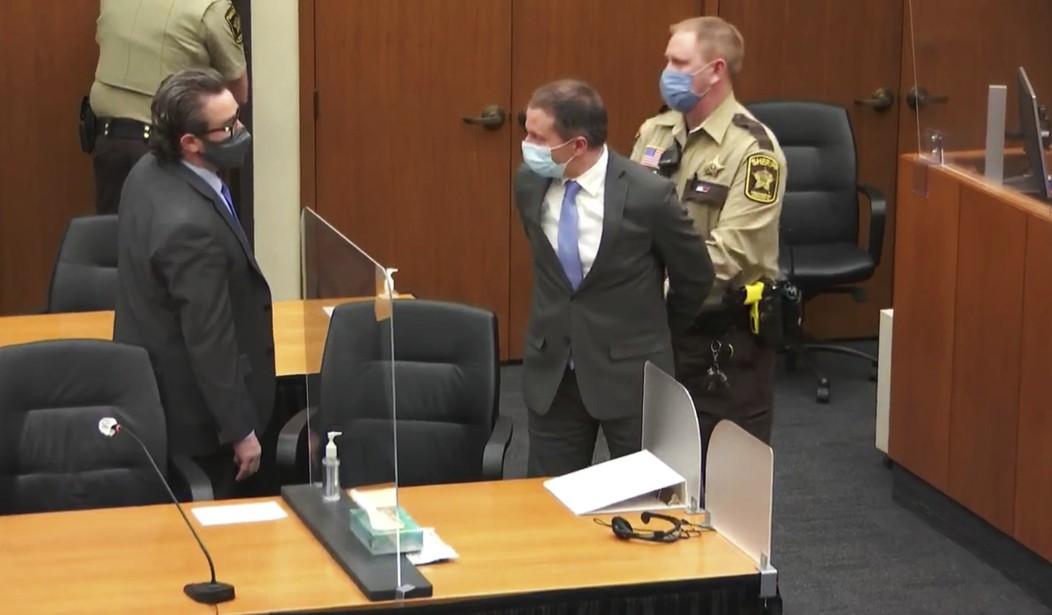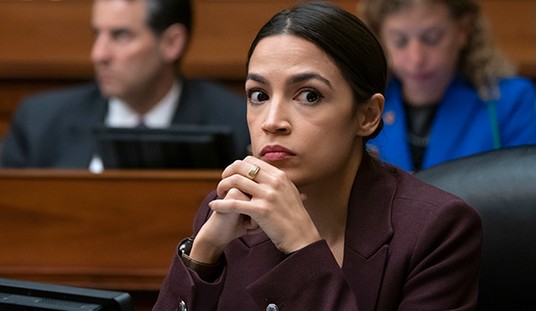A lot of people are cheering wildly at the Derek Chauvin murder verdict. "Kaboom! Touchdown! Big win for our side!" There's a sense of jubilation.
African American columnist Eugene Robinson in the Washington Post writes, "Derek Chauvin's conviction shouldn't feel like a victory. But it does." Touchdown!
Perhaps if you were to ask these guys "Why are you cheering?" they would say, "That's the sweet sentiment of justice." I don't have that feeling. My feeling is sober, almost somber.
Why? Well, it's not because I think Chauvin is innocent, the trial proved that he did nothing wrong. It's not that at all. In fact, going back now several months to when I first saw the video, my reaction was one of sort of almost uncontained fury. And I said that publicly at the time. Interestingly, this is not a situation that produced some big ideological divide from the beginning. No, what we saw on the videotape was, in fact, appalling. And the only question was, is that the full story? Was there other information left out? And that's why you have a trial. That's why you have a jury.
The reason that although I am satisfied with the verdict, it's very well quite possible that justice was done, but we don't know for sure. And why is that? It's because of the mob atmosphere surrounding the trial.
Recommended
It was Abraham Lincoln who said in his Lyceum Address of 1838, "There is no grievance, that is a fit object of redress by mob law." I don't think we can deny that there were powerful mob elements here. Not just the crowd outside screaming and banging, "We better get the verdict." But powerful political figures showing up egging on the mob. Notably Maxine Waters. She goes up there, she basically says, "We're expecting a guilty verdict. And if we don't get it, guys, go out there be in their face, stay on the street, be more confrontational." In other words, cause more violence. That's almost a classic definition of incitement right there. I saw Alan Dershowitz talking about it and he says, "Hey, this is basically what the old KKK used to do. I mean, the KKK would go up to the sheriff, you know, we better get a conviction or you'll be hearing from us."
This kind of thuggery, there are echoes of it. Now, the situations may be reversed from the KKK case. They were targeting a black accused man. In this case, it's a policeman accused of killing a black man. So in that sense, the racial roles may be reversed, but the behavior, the sort of idea that the mob is going to dictate what happens inside the courtroom, this is the troubling aspect. And then there's Joe Biden, talking about the fact, before the verdict, that the evidence is completely compelling and convincing to him as if he followed the trial minute by minute, which I'm sure he did not.
What we have here is this idea that and I'm sure it was in some ways felt by the jury, in fact, some jurors confess to this us upfront before they were even chosen, the fear that cities will burn. Our families will be threatened. There was an article in the local paper in Minneapolis, that was almost sort of saying, "By the way, guys, we're not going to tell you exactly where these jurors live, but we're going to give you enough hints about where they might live. So, you might be able to find them afterward." This is almost a case of using journalism as a form of intimidation.
Now, coming back to Eugene Robinson in his you know, "it shouldn't feel like a victory." There's a little element of decency in Robinson, he knows this should be a trial. The idea here is presumed innocent. The idea here is that the jury should be able to listen to the facts uncontaminated by outside pressures. He knows all that. But still, for him, it's a big score. And what is the score? I'm pretty sure that the way he looks at it is it's a racial score, basically blacks one white zero. Why? Because from the beginning, this was sort of seen through a racial lens. It's a white cop. It's a black victim.
So, this is a race fight. And the verdict is almost reminiscent of the OJ trial. Now, in the OJ trial, it was not guilty, in this case guilty. But in both cases, you got the feeling of "Touchdown! Our team wins a big one!" This is kind of a racial ball in the basket type of score. And I think this is really where my anxiety comes from. It's simply the idea that this is not what a trial should be. Ultimately, it was Greg Gutfeld of Fox News of all people who spilled the beans on it when he said something very revealing just yesterday.
"And now I'm going to just get really selfish. I'm glad that he was found guilty on all charges. Even if he might not be guilty of all charges," Gutfeld said.
Really? Wow. I mean, I think Gutfeld is really just trying to be sort of candid. He says, "I'm just trying to be honest here. I'm just trying to tell it like it is." But like it is for him means that we're looking at this trial, not as a trial of what one man did, or what one man supported by some other men did in a given situation. We're looking at this as a way to promote peace in America, not stoke the crowd, avoid more violence, let's not have Rodney King all over again.
Well, we don't sacrifice people in a free country in order to produce social peace. So what I'm kind of saying is that if it wasn't for Maxine Waters, if it wasn't for the mob, if it wasn't for Antifa taking credit... Antifa said, "When the police murdered George Floyd demonstrators brought that tragedy to everyone's attention by laying siege to the police precinct. If not for their courage, most people would never have learned his name. Let's give them the credit, not the courts." In other words, what Antifa's saying is that "We the thugs, we produced this outcome. Not some judicial procedure that was ultimately just deferring to us."
And so my conclusion here is really this, that if you didn't have this intimidation, you didn't have this mob mentality, you didn't have this air of prejudice and prejudgment, well, then we would have an untainted process. Well, we then would have a verdict in which we could take some satisfaction, in which we could have some confidence. And then even if I wasn't saying touchdown or celebrating, I might feel that perhaps, in this case, justice was in the end done.
Subscribe to the Dinesh D'Souza podcast on Apple, Google and Spotify or watch on Rumble, YouTube and Salem now.

























